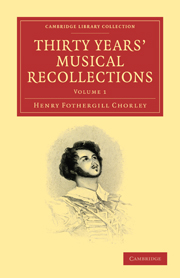THE YEAR 1830
Published online by Cambridge University Press: 29 August 2010
Summary
What a change has passed over the foreign musical drama in England since the foregoing was the programme of London's Italian Opera season!—The orchestra in 1830 was, compared with what it is now, meagre and ill-disciplined;—the chorus was an ear-torment rather than an ear-pleasure;—the scenery and appointments were shabby to penury;—but “Guillaume Tell,” (desecrated as “Massaniello” had been, into ballet form), was new.—It was the year when Signor Rossini's formidable Italian rival (as the public has since learned to think) first was heard in England. It was the year of the first appearances here of Lablache, and of Mademoiselle Taglioni.—Each of the three events noted marks an epoch.
Though the predominance of the composer of “Il Barbiére” had as yet given way in no respect, there were other modern Italian composers whose works were worth trying. Signor Mercadante was little known; but the clever and level music of his early operas, in spite of their containing effective airs and concerted pieces, is too utterly devoid of freshness or individuality for them to have stood a chance of taking a permanent root here, so long as Signor Rossini was in the ascendancy.—With the temporary mitigation of that master's popularity they were sure to perish for ever, since their life amounted to his forms, reproduced second-hand.—It is not so with “Il Pirata.” Weak as that opera is (only containing a couple of tenor airs which are sung now), an individuality exists in Bellini's music. Whenever individuality is not mere eccentricity there is always interest in it—there is always a chance of that interest becoming a charm.
- Type
- Chapter
- Information
- Thirty Years' Musical Recollections , pp. 1 - 21Publisher: Cambridge University PressPrint publication year: 2009First published in: 1862



